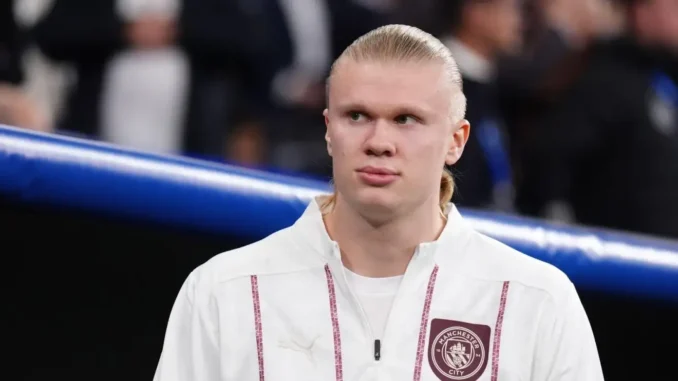
The air crackled with anticipation, the roar of the crowd a deafening symphony, as Manchester City prepared to face their arch-rivals, Liverpool. But a shadow of uncertainty hung over the Etihad Stadium, a question mark hovering over the availability of their star striker, Erling Haaland. The Norwegian goal-scoring machine, who had terrorized defenses throughout the season, was battling an injury, leaving fans and manager Pep Guardiola in a state of anxious anticipation.
Haaland’s journey to Manchester City had been nothing short of spectacular. His arrival was heralded as a game-changer, a potent weapon in Guardiola’s already formidable arsenal. And he didn’t disappoint. Goals flowed effortlessly from his boots, records tumbled, and Haaland quickly established himself as one of the most prolific strikers in the world. His presence instilled fear in the hearts of opponents, his name echoing in the nightmares of defenders.
But even the most formidable warriors are vulnerable. In the grueling battle against Newcastle, Haaland suffered a knee injury, a twist of fate that threatened to derail his momentum and cast a pall over City’s aspirations.1 The news sent ripples of concern through the club and its supporters, their hopes hanging in the balance.
Guardiola, a master tactician, faced a dilemma. Should he risk his star striker in such a crucial encounter, or should he err on the side of caution and protect him for the battles ahead? The decision weighed heavily on his mind, the stakes impossibly high.
“Erling tried to train yesterday,” Guardiola revealed, his voice laced with concern. “But he has discomfort walking, for example with stairs, and we spoke yesterday and this morning, and he said he’s not ready, he doesn’t feel good.”2
The manager’s words painted a picture of a player battling against his own body, his desire to play warring with the pain that gnawed at his knee. Haaland, a warrior at heart, yearned to be on the pitch, to lead his team into battle. But the wisdom of his manager and the dictates of his body held him back.
“Not far off,” Guardiola offered, a glimmer of hope in his voice. “Was close but not enough. He trained a bit yesterday, but we spoke yesterday, this morning, and he said he doesn’t feel good, so another one.”3
The decision was made. Haaland would not feature against Liverpool. The news was a blow to City’s hopes, but it was a decision made with the long-term interests of the player and the team in mind.
“Of course, Erling is massively important for us,” Guardiola acknowledged. “You don’t need to be a manager to realize, but it is what it is. During the seasons it happens, we are used this season to many cases, and it could not be different4 today.”
Guardiola’s words echoed the reality of professional football. Injuries are an inevitable part of the game, a constant threat that lurks in the shadows. Teams must learn to adapt, to overcome these setbacks, to find strength in unity and resilience.
The absence of Haaland would undoubtedly be felt. His goals, his presence, his sheer force of nature, would be missed. But Guardiola had instilled in his team a philosophy of collective strength, a belief that they could overcome any obstacle, even the absence of their talisman.
“We have other players who can step up,” Guardiola asserted, his voice filled with confidence. “We have a squad full of talent, players who are hungry to prove themselves. We will find a way to win, even without Erling.”
The clash against Liverpool loomed large, a battle between two titans of English football. The absence of Haaland added an extra layer of intrigue, a sense of unpredictability. Could City overcome the loss of their star striker and emerge victorious? Or would Liverpool seize the opportunity and gain the upper hand?
The answers would be revealed on the pitch, where passion, skill, and determination would collide. The absence of Haaland would be a test of City’s resolve, a challenge to their collective strength. It would be a battle fought not just with skill and strategy, but with heart and spirit.
As the two teams prepared to lock horns, the world watched with bated breath, eager to witness the unfolding drama. The absence of Haaland may have cast a shadow over the Etihad Stadium, but it also presented an opportunity for others to shine, for new heroes to emerge. The stage was set for a spectacle, a clash of titans that would be remembered for its intensity, its passion, and its unpredictability.
Leave a Reply